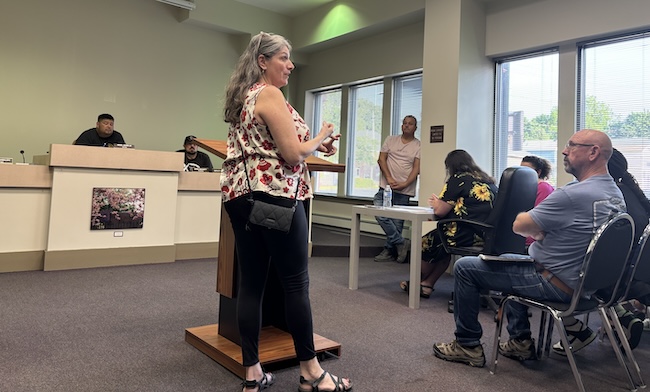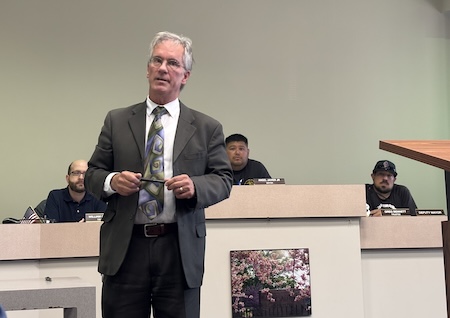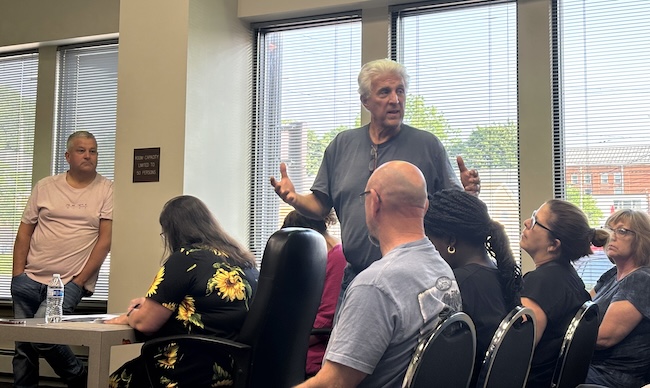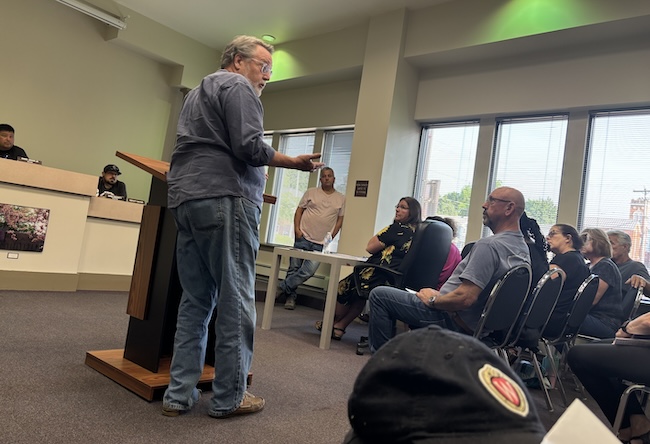Albion residents speak out about potential loss of services and unknowns if village government goes away

Photos by Tom Rivers: Karen Conn, chairwoman of the Village of Albion Planning Board, said the village needs to work to encourage more housing options for residents. Conn also works as an Albion teacher and real estate business owner. She speaks during a public hearing Wednesday in the village hall about the possibly dissolution of the village and folding it into the towns of Albion and Gaines. “It’s all of us,” she told a packed village hall. “We all have to do our part and choose Albion.”
ALBION – The Village Board held a public hearing on dissolving the village and consolidating its services with the towns of Albion and Gaines.
Residents said there are many unknown answers if that change happened, primarily on whether there would continue to be an Albion Police Department and other villages services.

Village attorney John Gavenda said the Village Board isn’t formally moving towards consolidation or dissolution of the village. Wednesday’s hearing was an initial step to hear from the public, Gavenda said. In back from left are Trustee William Gabalski, Mayor Angel Javier Jr. and Trustee Greg Bennett.
Mayor Angel Javier Jr. said there is no push to dissolve the village at this time, but he said village officials and community need to keep having the discussion about the high taxes in the village and other big increases coming with water rates due to upgrades at the water plant and other infrastructure.
Javier worries the village structure of government in Orleans County may not be sustainable.
“What can we do to make Albion more affordable?” Javier said. “There might be difficult conversations. If you want the services you’re going to have to pay.”
Some residents asked just how dire the situation is for the village, and what kind of savings could the village expect if it was folded into the towns.
There was a consolidation/dissolution study in 2008 led by the Center for Governmental Research. That study concluded the village and towns of Albion and Gaines would see $336,497 in efficiency gains through more cooperation and consolidation. The Center for Governmental Research studied the three municipalities’ combined $7.5 million annual budgets in 2007, looking for ways to better share costs. A committee recommended the village dissolve. But the Village Board opted against putting the issue to a public vote.
Since then, the fire department has been removed from the village budget and now function as a joint fire district with the towns of Albion and Gaines, a move that doubled the fire department’s budget in 2025. Fire commissioners said the previous budgets left the department woefully underfunded, and didn’t set aside reserves for new trucks and equipment.
Kevin Sheehan was on the board in 2008. He said dissolution/consolidation not only was rejected in Albion, but also in Medina in a public vote in 2014. He doesn’t want to lose the Albion Police Department and have to rely on Sheriff’s deputies.

Joe Martillotta said he favors consolidation of local governments. He noted there are 10 towns, four villages, five school districts, a county governments and several fire districts. He believes a streamlined local government would operate more efficiently and at a reduced cost for taxpayers.
Village resident Jason Dragon said the current system pushes too much of the local government costs on village taxpayers. He said the county doesn’t give enough in the local sales tax, freezing the towns and villages at the same level for 24 years now, at a time when the local sales tax has more than doubled.
Dragon said the county and towns have unfairly treated the village for decades, resulting in taxes that are wildly out of whack for the village.
“There is not enough money to go around in the village structure,” Dragon said.
If there is dissolution, the current village functions would likely be assumed by the towns or county, Dragon said. The village employees would shift to a different municipality and carry out similar duties.
He envisions lower and more equitable taxes in the village, which would ring in mor investment from residents and businesses.
Dragon said the village may need to dissolve to get some tax relief, because he doubts the other government entities will provide any relief to Albion.
“I don’t see anything where the towns or county will voluntarily change the situation,” he said.
Villkage trustee Joyce Riley thinks there may be ways of sharing services with neighboring towns to lighten the village’s load without going to a dissolution. She noted the village and Town of Albion share a code enforcement officer in Chris Kinter.
“Where can we share and not lose our identity?” she said.
Paul Weiss, an attorney for Albion’s police union, said the village government is an effective way to provide services, including the police department. He said dissolving the village will prove costly and will result in diminished services for the village residents.
Janet Navarra, a member of the Albion Planning Board, reminded the board she presented them with a list if grant opportunities about a year ago that would help improve the downtown and other parts of the community. She said there are state funds and other programs to help the village without eliminating the village government.
She noted the vacant registry law would also help get residents and businesses in some of the long dormant sites in the downtown.
“You’re raising taxes but you’re not doing anything to increase the tax base,” she said.
Navarra said Albion gets cited in some websites as one of the ugliest communities in New York State.
“It’s very embarrassing to see that,” she said. “We’re standing her floundering when there is money available to help us.”
Major Javier said the board will continue to discuss the issue and could have another public hearing on the matter in the next 60 to 90 days.

Craig Tuohey, the Zoning Board chairman, also is on a committee working to update the comprehensive plan. That process should identify areas for growth with business and residential development, Tuohey said, which could help ease the tax burden. Tuohey urged the community to be part of the comprehensive plan revisions.

























































